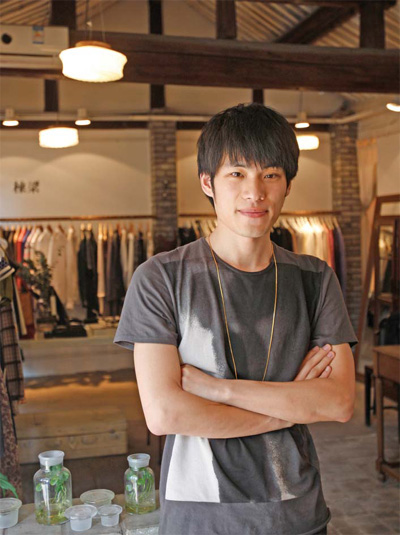Beijing boutique takes business-casual approach
Updated: 2011-06-17 13:59
By Lin Jing (China Daily European Weekly)
|
|
Wang Yaoyu's black T-shirt and skinny jeans are appropriate work attire for this 29-year-old.
He is part owner of Dong Liang Studio, one of the first boutique stores in Beijing devoted to showcasing independent Chinese designers' products.
In November 2009, Wang and his business partner, Nan Lang, opened a retail store located in Wudaoying Hutong, Dongcheng district.
Wang says that the quiet hutong, a narrow alley, is the perfect location for a boutique store.
"Right now there are only a small number of people into designer clothing, so it's not necessary to put Dong Liang in a noisy shopping mall."
With its clean and simple design, the store's dcor reflects an older Chinese home. The wooden desk and exposed beams also communicate an antique feeling.
But no typical Chinese elements can be found in the clothing. Most of the items have a Western feel, and mainly in two colors: black and white.
Wang says they only choose clothing lines that have a consistent style and fine fabric. "The clothing should first be practical for daily dress, and have a simple but classical style, which is easy to carry."
Looking back on his business venture, he says he shares something in common with budding fashion designers: the difficulties of starting a new business.
"Most young Chinese designers are at their beginning stage and experiencing really hard times. It would be lucky if any of them could make ends meet. The fact is that, most of them are still losing money in designing."
Wang says that the most challenging part of starting the business is convincing designers to join Dong Liang. "At first, many designers doubted our abilities. So we had to present them with a feasible proposal and demonstrate our sincerity for long-term cooperation."
It took three months for Wang and his partner to find independent designers with a mature design style and a complete line. But the dedication paid off.
In one year, the number of designers featured in the store grew from five to 21. And now he's the one getting calls and e-mails from designers asking for help. "Some designers would like to join Dong Liang, because it is a recognition of their design style and product quality."
Some designers they selected to showcase in their store have already gained a reputation in China, such as VegaZaishiWang, the owner of the brand SFORZANDO, and Ye Qian, the designer of Ye's.
Wang says he fully understands the predicament Chinese designers now face in the fashion world.
"As the whole market is getting better, more designers come out of companies and open their own design studios and build up their own brands.
"But the process is not that easy. The first obstacle is financing. But seldom do investors give large amounts of money to designers and wait for the brand to mature and become well-known. It takes persistence."
He adds that young designers cannot afford to spend the time and energy on marketing and promotion when there are so many other details to worry about.
"Fabric and production is also an issue. It is hard to find any good fabric for reasonable prices, especially at the moment when commodity prices are increasing. And normally factories are reluctant to take small orders from designers. They prefer large orders from big brands such as Zara, which are easy to produce, and the revenue is much higher."
Wang, though, is still confident about the future of Chinese designers.
"I would quit if I did not have any confidence," he laughs. "The future fashion center will definitely be inChina, because the market is always changing. And the Chinese market is big enough to support the development of designers. Now many young Chinese designers, such as Alexander Wang and Philip Lim, have already become well-known in the world."
The words "Dong Liang" mean backbone in Chinese, and some might think that the store regards itself as the backbone ofChinese fashion design.
But Wang said they aren't arrogant.
"We just picked up a name that sounds more Chinese, easy to remember and better looking intraditional Chinese characters."
The thought process behind the name obviously works.
Business is booming for Dong Liang, which sells clothing for more than the market average, ranging from 32.3 euros to 644 euros, depending on the fabric and designer.
Spring sales are about four times compared to the same time last year and the partners are busy readying a second store inShanghai, which is expected to open in August.
And their products have drawn the attention of Chinese celebrities.
Zhou Xun, a mainland actress and Valen Hsu, a pop singer fromTaiwan, are among Dong Liang's frequent customers.
But Wang is looking at the bigger picture. He says if the time comes, Dong Liang wants to collaborate with designer stores in Western countries to introduce Chinese brands to the world, and influence the mainstream fashion trends.
"Designers' products should not always appeal to a niche customer. After all, they are still commercial products. Every well-known brand, such as Louis VuittonandGucci, all experienced the same path, from a small consumer base to the public. It is inevitable road for Chinese designers as well."
E-paper

Pearl paradise
Dreams of a 'crazy' man turned out to be a real pearler for city
Literary beacon
Venice of china
Up to the mark
Specials

Power of profit
Western companies can learn from management practices of firms in emerging economies

Foreign-friendly skies
About a year ago, 48-year-old Roy Weinberg gave up his job with US Airways, moved to Shanghai and became a captain for China's Spring Airlines.

Plows, tough guys and real men
在这个时代,怎样才"够男人"? On the character "Man"

